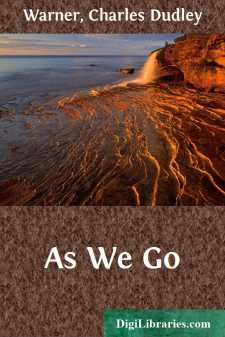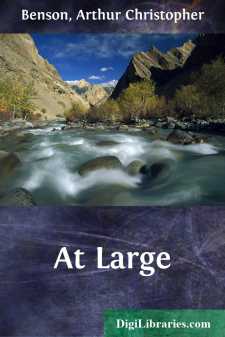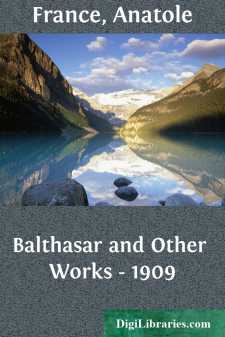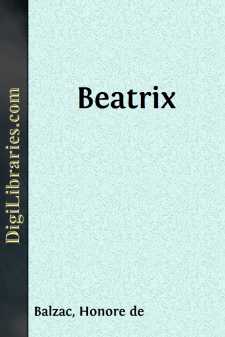Literary Collections
- American 84
- Ancient, Classical & Medieval 14
- Asian 1
- Australian & Oceanian 1
- Canadian 55
- Continental European 121
- English, Irish, Scottish, Welsh 179
- Essays 160
- General 24
- Letters 46
- Middle Eastern 1
Literary Collections Books
Sort by:
by:
Walter Pater
STYLE [5] SINCE all progress of mind consists for the most part in differentiation, in the resolution of an obscure and complex object into its component aspects, it is surely the stupidest of losses to confuse things which right reason has put asunder, to lose the sense of achieved distinctions, the distinction between poetry and prose, for instance, or, to speak more exactly, between the laws and...
more...
OUR PRESIDENT We are so much accustomed to kings and queens and other privileged persons of that sort in this world that it is only on reflection that we wonder how they became so. The mystery is not their continuance, but how did they get a start? We take little help from studying the bees —originally no one could have been born a queen. There must have been not only a selection, but an election,...
more...
I. THE SCENE Yes, of course it is an experiment! But it is made in corpore vili. It is not irreparable, and there is no reason, more's the pity, why I should not please myself. I will ask—it is a rhetorical question which needs no answer—what is a hapless bachelor to do, who is professionally occupied and tied down in a certain place for just half the year? What is he to do with the other...
more...
by:
Honore de Balzac
AT THE SIGN OF THE CAT AND RACKET Half-way down the Rue Saint-Denis, almost at the corner of the Rue du Petit-Lion, there stood formerly one of those delightful houses which enable historians to reconstruct old Paris by analogy. The threatening walls of this tumbledown abode seemed to have been decorated with hieroglyphics. For what other name could the passer-by give to the Xs and Vs which the...
more...
INTRODUCTION The story of Love, that simple theme with variations ad libitum, ad infinitum, is never old, never stale, never out-of-date. And as we sometimes seek rest from the brilliant audacities and complex passions of Wagner or Tschaikowsky in the tender simplicity of some ancient English air, so we occasionally turn with relief from the wit and insight and subtlety of our modern novelists to the...
more...
INTRODUCTION: Dr. Johnson was hailed the colossus of Literature by a generation who measured him against men of no common mould—against Hume, Robertson, Gibbon, Warburton, the Wartons, Fielding, Richardson, Smollett, Gray, Goldsmith, and Burke. Any one of these may have surpassed the great lexicographer in some branch of learning or domain of genius; but as a man of letters, in the highest sense of...
more...
FIRST STUDY The fire on the hearth has almost gone out in New England; the hearth has gone out; the family has lost its center; age ceases to be respected; sex is only distinguished by a difference between millinery bills and tailors' bills; there is no more toast-and-cider; the young are not allowed to eat mince-pies at ten o'clock at night; half a cheese is no longer set to toast before the...
more...
by:
Anatole France
In those days Balthasar, whom the Greeks called Saracin, reigned in Ethiopia. He was black, but comely of countenance. He had a simple soul and a generous heart The third year of his reign, which was the twenty-second of his age, he left his dominions on a visit to Balkis, Queen of Sheba. The mage Sembobitis and the eunuch Menkera accompanied him. He had in his train seventy-five camels bearing...
more...
A MIST WRAITH The autumn afternoon was fading into evening. It had been cloudy weather, but the clouds had softened and broken up. Now they were lost in slowly darkening blue. The sea was perfectly and utterly still. It seemed to sleep, but in its sleep it still waxed with the rising tide. The eye could not mark its slow increase, but Beatrice, standing upon the farthest point of the Dog Rocks, idly...
more...
by:
Honore de Balzac
I. A BRETON TOWN AND MANSION France, especially in Brittany, still possesses certain towns completely outside of the movement which gives to the nineteenth century its peculiar characteristics. For lack of quick and regular communication with Paris, scarcely connected by wretched roads with the sub-prefecture, or the chief city of their own province, these towns regard the new civilization as a...
more...











